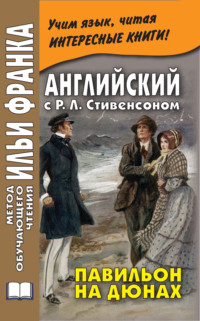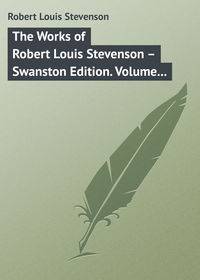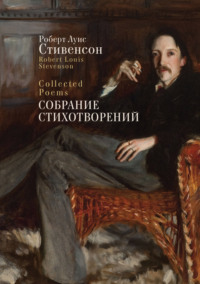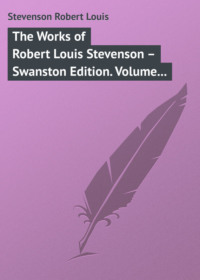 полная версия
полная версияEssays of Travel
The ship moved over the uneven sea with a gentle and cradling movement. The ponderous, organic labours of the engine in her bowels occupied the mind, and prepared it for slumber. From time to time a heavier lurch would disturb me as I lay, and recall me to the obscure borders of consciousness; or I heard, as it were through a veil, the clear note of the clapper on the brass and the beautiful sea-cry, ‘All’s well!’ I know nothing, whether for poetry or music, that can surpass the effect of these two syllables in the darkness of a night at sea.
The day dawned fairly enough, and during the early part we had some pleasant hours to improve acquaintance in the open air; but towards nightfall the wind freshened, the rain began to fall, and the sea rose so high that it was difficult to keep ones footing on the deck. I have spoken of our concerts. We were indeed a musical ship’s company, and cheered our way into exile with the fiddle, the accordion, and the songs of all nations. Good, bad, or indifferent – Scottish, English, Irish, Russian, German or Norse, – the songs were received with generous applause. Once or twice, a recitation, very spiritedly rendered in a powerful Scottish accent, varied the proceedings; and once we sought in vain to dance a quadrille, eight men of us together, to the music of the violin. The performers were all humorous, frisky fellows, who loved to cut capers in private life; but as soon as they were arranged for the dance, they conducted themselves like so many mutes at a funeral. I have never seen decorum pushed so far; and as this was not expected, the quadrille was soon whistled down, and the dancers departed under a cloud. Eight Frenchmen, even eight Englishmen from another rank of society, would have dared to make some fun for themselves and the spectators; but the working man, when sober, takes an extreme and even melancholy view of personal deportment. A fifth-form schoolboy is not more careful of dignity. He dares not be comical; his fun must escape from him unprepared, and above all, it must be unaccompanied by any physical demonstration. I like his society under most circumstances, but let me never again join with him in public gambols.
But the impulse to sing was strong, and triumphed over modesty and even the inclemencies of sea and sky. On this rough Saturday night, we got together by the main deck-house, in a place sheltered from the wind and rain. Some clinging to a ladder which led to the hurricane deck, and the rest knitting arms or taking hands, we made a ring to support the women in the violent lurching of the ship; and when we were thus disposed, sang to our hearts’ content. Some of the songs were appropriate to the scene; others strikingly the reverse. Bastard doggrel of the music-hall, such as, ‘Around her splendid form, I weaved the magic circle,’ sounded bald, bleak, and pitifully silly. ‘We don’t want to fight, but, by Jingo, if we do,’ was in some measure saved by the vigour and unanimity with which the chorus was thrown forth into the night. I observed a Platt-Deutsch mason, entirely innocent of English, adding heartily to the general effect. And perhaps the German mason is but a fair example of the sincerity with which the song was rendered; for nearly all with whom I conversed upon the subject were bitterly opposed to war, and attributed their own misfortunes, and frequently their own taste for whisky, to the campaigns in Zululand and Afghanistan.
Every now and again, however, some song that touched the pathos of our situation was given forth; and you could hear by the voices that took up the burden how the sentiment came home to each, ‘The Anchor’s Weighed’ was true for us. We were indeed ‘Rocked on the bosom of the stormy deep.’ How many of us could say with the singer, ‘I’m lonely to-night, love, without you,’ or, ‘Go, some one, and tell them from me, to write me a letter from home’! And when was there a more appropriate moment for ‘Auld Lang Syne’ than now, when the land, the friends, and the affections of that mingled but beloved time were fading and fleeing behind us in the vessel’s wake? It pointed forward to the hour when these labours should be overpast, to the return voyage, and to many a meeting in the sanded inn, when those who had parted in the spring of youth should again drink a cup of kindness in their age. Had not Burns contemplated emigration, I scarce believe he would have found that note.
All Sunday the weather remained wild and cloudy; many were prostrated by sickness; only five sat down to tea in the second cabin, and two of these departed abruptly ere the meal was at an end. The Sabbath was observed strictly by the majority of the emigrants. I heard an old woman express her surprise that ‘the ship didna gae doon,’ as she saw some one pass her with a chess-board on the holy day. Some sang Scottish psalms. Many went to service, and in true Scottish fashion came back ill pleased with their divine. ‘I didna think he was an experienced preacher,’ said one girl to me.
Is was a bleak, uncomfortable day; but at night, by six bells, although the wind had not yet moderated, the clouds were all wrecked and blown away behind the rim of the horizon, and the stars came out thickly overhead. I saw Venus burning as steadily and sweetly across this hurly-burly of the winds and waters as ever at home upon the summer woods. The engine pounded, the screw tossed out of the water with a roar, and shook the ship from end to end; the bows battled with loud reports against the billows: and as I stood in the lee-scuppers and looked up to where the funnel leaned out, over my head, vomiting smoke, and the black and monstrous top-sails blotted, at each lurch, a different crop of stars, it seemed as if all this trouble were a thing of small account, and that just above the mast reigned peace unbroken and eternal.
STEERAGE SCENES
Our companion (Steerage No. 2 and 3) was a favourite resort. Down one flight of stairs there was a comparatively large open space, the centre occupied by a hatchway, which made a convenient seat for about twenty persons, while barrels, coils of rope, and the carpenter’s bench afforded perches for perhaps as many more. The canteen, or steerage bar, was on one side of the stair; on the other, a no less attractive spot, the cabin of the indefatigable interpreter.
I have seen people packed into this space like herrings in a barrel, and many merry evenings prolonged there until five bells, when the lights were ruthlessly extinguished and all must go to roost.
It had been rumoured since Friday that there was a fiddler aboard, who lay sick and unmelodious in Steerage No. 1; and on the Monday forenoon, as I came down the companion, I was saluted by something in Strathspey time. A white-faced Orpheus was cheerily playing to an audience of white-faced women. It was as much as he could do to play, and some of his hearers were scarce able to sit; yet they had crawled from their bunks at the first experimental flourish, and found better than medicine in the music. Some of the heaviest heads began to nod in time, and a degree of animation looked from some of the palest eyes. Humanly speaking, it is a more important matter to play the fiddle, even badly, than to write huge works upon recondite subjects. What could Mr. Darwin have done for these sick women? But this fellow scraped away; and the world was positively a better place for all who heard him. We have yet to understand the economical value of these mere accomplishments. I told the fiddler he was a happy man, carrying happiness about with him in his fiddle-case, and he seemed alive to the fact.
‘It is a privilege,’ I said. He thought a while upon the word, turning it over in his Scots head, and then answered with conviction, ‘Yes, a privilege.’
That night I was summoned by ‘Merrily danced the Quake’s wife’ into the companion of Steerage No. 4 and 5. This was, properly speaking, but a strip across a deck-house, lit by a sickly lantern which swung to and fro with the motion of the ship. Through the open slide-door we had a glimpse of a grey night sea, with patches of phosphorescent foam flying, swift as birds, into the wake, and the horizon rising and falling as the vessel rolled to the wind. In the centre the companion ladder plunged down sheerly like an open pit. Below, on the first landing, and lighted by another lamp, lads and lasses danced, not more than three at a time for lack of space, in jigs and reels and hornpipes. Above, on either side, there was a recess railed with iron, perhaps two feet wide and four long, which stood for orchestra and seats of honour. In the one balcony, five slatternly Irish lasses sat woven in a comely group. In the other was posted Orpheus, his body, which was convulsively in motion, forming an odd contrast to his somnolent, imperturbable Scots face. His brother, a dark man with a vehement, interested countenance, who made a god of the fiddler, sat by with open mouth, drinking in the general admiration and throwing out remarks to kindle it.
‘That’s a bonny hornpipe now,’ he would say, ‘it’s a great favourite with performers; they dance the sand dance to it.’ And he expounded the sand dance. Then suddenly, it would be a long, ‘Hush!’ with uplifted finger and glowing, supplicating eyes, ‘he’s going to play “Auld Robin Gray” on one string!’ And throughout this excruciating movement, – ‘On one string, that’s on one string!’ he kept crying. I would have given something myself that it had been on none; but the hearers were much awed. I called for a tune or two, and thus introduced myself to the notice of the brother, who directed his talk to me for some little while, keeping, I need hardly mention, true to his topic, like the seamen to the star. ‘He’s grand of it,’ he said confidentially. ‘His master was a music-hall man.’ Indeed the music-hall man had left his mark, for our fiddler was ignorant of many of our best old airs; ‘Logie o’ Buchan,’ for instance, he only knew as a quick, jigging figure in a set of quadrilles, and had never heard it called by name. Perhaps, after all, the brother was the more interesting performer of the two. I have spoken with him afterwards repeatedly, and found him always the same quick, fiery bit of a man, not without brains; but he never showed to such advantage as when he was thus squiring the fiddler into public note. There is nothing more becoming than a genuine admiration; and it shares this with love, that it does not become contemptible although misplaced.
The dancing was but feebly carried on. The space was almost impracticably small; and the Irish wenches combined the extreme of bashfulness about this innocent display with a surprising impudence and roughness of address. Most often, either the fiddle lifted up its voice unheeded, or only a couple of lads would be footing it and snapping fingers on the landing. And such was the eagerness of the brother to display all the acquirements of his idol, and such the sleepy indifference of the performer, that the tune would as often as not be changed, and the hornpipe expire into a ballad before the dancers had cut half a dozen shuffles.
In the meantime, however, the audience had been growing more and more numerous every moment; there was hardly standing-room round the top of the companion; and the strange instinct of the race moved some of the newcomers to close both the doors, so that the atmosphere grew insupportable. It was a good place, as the saying is, to leave.
The wind hauled ahead with a head sea. By ten at night heavy sprays were flying and drumming over the forecastle; the companion of Steerage No. 1 had to be closed, and the door of communication through the second cabin thrown open. Either from the convenience of the opportunity, or because we had already a number of acquaintances in that part of the ship, Mr. Jones and I paid it a late visit. Steerage No. 1 is shaped like an isosceles triangle, the sides opposite the equal angles bulging outward with the contour of the ship. It is lined with eight pens of sixteen bunks apiece, four bunks below and four above on either side. At night the place is lit with two lanterns, one to each table. As the steamer beat on her way among the rough billows, the light passed through violent phases of change, and was thrown to and fro and up and down with startling swiftness. You were tempted to wonder, as you looked, how so thin a glimmer could control and disperse such solid blackness. When Jones and I entered we found a little company of our acquaintances seated together at the triangular foremost table. A more forlorn party, in more dismal circumstances, it would be hard to imagine. The motion here in the ship’s nose was very violent; the uproar of the sea often overpoweringly loud. The yellow flicker of the lantern spun round and round and tossed the shadows in masses. The air was hot, but it struck a chill from its foetor.
From all round in the dark bunks, the scarcely human noises of the sick joined into a kind of farmyard chorus. In the midst, these five friends of mine were keeping up what heart they could in company. Singing was their refuge from discomfortable thoughts and sensations. One piped, in feeble tones, ‘Oh why left I my hame?’ which seemed a pertinent question in the circumstances. Another, from the invisible horrors of a pen where he lay dog-sick upon the upper-shelf, found courage, in a blink of his sufferings, to give us several verses of the ‘Death of Nelson’; and it was odd and eerie to hear the chorus breathe feebly from all sorts of dark corners, and ‘this day has done his dooty’ rise and fall and be taken up again in this dim inferno, to an accompaniment of plunging, hollow-sounding bows and the rattling spray-showers overhead.
All seemed unfit for conversation; a certain dizziness had interrupted the activity of their minds; and except to sing they were tongue-tied. There was present, however, one tall, powerful fellow of doubtful nationality, being neither quite Scotsman nor altogether Irish, but of surprising clearness of conviction on the highest problems. He had gone nearly beside himself on the Sunday, because of a general backwardness to indorse his definition of mind as ‘a living, thinking substance which cannot be felt, heard, or seen’ – nor, I presume, although he failed to mention it, smelt. Now he came forward in a pause with another contribution to our culture.
‘Just by way of change,’ said he, ‘I’ll ask you a Scripture riddle. There’s profit in them too,’ he added ungrammatically.
This was the riddle —
C and PDid agreeTo cut down C;But C and PCould not agreeWithout the leave of G;All the people cried to seeThe crueltieOf C and P.Harsh are the words of Mercury after the songs of Apollo! We were a long while over the problem, shaking our heads and gloomily wondering how a man could be such a fool; but at length he put us out of suspense and divulged the fact that C and P stood for Caiaphas and Pontius Pilate.
I think it must have been the riddle that settled us; but the motion and the close air likewise hurried our departure. We had not been gone long, we heard next morning, ere two or even three out of the five fell sick. We thought it little wonder on the whole, for the sea kept contrary all night. I now made my bed upon the second cabin floor, where, although I ran the risk of being stepped upon, I had a free current of air, more or less vitiated indeed, and running only from steerage to steerage, but at least not stagnant; and from this couch, as well as the usual sounds of a rough night at sea, the hateful coughing and retching of the sick and the sobs of children, I heard a man run wild with terror beseeching his friend for encouragement. ‘The ship’s going down!’ he cried with a thrill of agony. ‘The ship’s going down!’ he repeated, now in a blank whisper, now with his voice rising towards a sob; and his friend might reassure him, reason with him, joke at him – all was in vain, and the old cry came back, ‘The ship’s going down!’ There was something panicky and catching in the emotion of his tones; and I saw in a clear flash what an involved and hideous tragedy was a disaster to an emigrant ship. If this whole parishful of people came no more to land, into how many houses would the newspaper carry woe, and what a great part of the web of our corporate human life would be rent across for ever!
The next morning when I came on deck I found a new world indeed. The wind was fair; the sun mounted into a cloudless heaven; through great dark blue seas the ship cut a swath of curded foam. The horizon was dotted all day with companionable sails, and the sun shone pleasantly on the long, heaving deck.
We had many fine-weather diversions to beguile the time. There was a single chess-board and a single pack of cards. Sometimes as many as twenty of us would be playing dominoes for love. Feats of dexterity, puzzles for the intelligence, some arithmetical, some of the same order as the old problem of the fox and goose and cabbage, were always welcome; and the latter, I observed, more popular as well as more conspicuously well done than the former. We had a regular daily competition to guess the vessel’s progress; and twelve o’clock, when the result was published in the wheel-house, came to be a moment of considerable interest. But the interest was unmixed. Not a bet was laid upon our guesses. From the Clyde to Sandy Hook I never heard a wager offered or taken. We had, besides, romps in plenty. Puss in the Corner, which we had rebaptized, in more manly style, Devil and four Corners, was my own favourite game; but there were many who preferred another, the humour of which was to box a person’s ears until he found out who had cuffed him.
This Tuesday morning we were all delighted with the change of weather, and in the highest possible spirits. We got in a cluster like bees, sitting between each other’s feet under lee of the deck-houses. Stories and laughter went around. The children climbed about the shrouds. White faces appeared for the first time, and began to take on colour from the wind. I was kept hard at work making cigarettes for one amateur after another, and my less than moderate skill was heartily admired. Lastly, down sat the fiddler in our midst and began to discourse his reels, and jigs, and ballads, with now and then a voice or two to take up the air and throw in the interest of human speech.
Through this merry and good-hearted scene there came three cabin passengers, a gentleman and two young ladies, picking their way with little gracious titters of indulgence, and a Lady-Bountiful air about nothing, which galled me to the quick. I have little of the radical in social questions, and have always nourished an idea that one person was as good as another. But I began to be troubled by this episode. It was astonishing what insults these people managed to convey by their presence. They seemed to throw their clothes in our faces. Their eyes searched us all over for tatters and incongruities. A laugh was ready at their lips; but they were too well-mannered to indulge it in our hearing. Wait a bit, till they were all back in the saloon, and then hear how wittily they would depict the manners of the steerage. We were in truth very innocently, cheerfully, and sensibly engaged, and there was no shadow of excuse for the swaying elegant superiority with which these damsels passed among us, or for the stiff and waggish glances of their squire. Not a word was said; only when they were gone Mackay sullenly damned their impudence under his breath; but we were all conscious of an icy influence and a dead break in the course of our enjoyment.
STEERAGE TYPES
We had a fellow on board, an Irish-American, for all the world like a beggar in a print by Callot; one-eyed, with great, splay crow’s-feet round the sockets; a knotty squab nose coming down over his moustache; a miraculous hat; a shirt that had been white, ay, ages long ago; an alpaca coat in its last sleeves; and, without hyperbole, no buttons to his trousers. Even in these rags and tatters, the man twinkled all over with impudence like a piece of sham jewellery; and I have heard him offer a situation to one of his fellow-passengers with the air of a lord. Nothing could overlie such a fellow; a kind of base success was written on his brow. He was then in his ill days; but I can imagine him in Congress with his mouth full of bombast and sawder. As we moved in the same circle, I was brought necessarily into his society. I do not think I ever heard him say anything that was true, kind, or interesting; but there was entertainment in the man’s demeanour. You might call him a half-educated Irish Tigg.
Our Russian made a remarkable contrast to this impossible fellow. Rumours and legends were current in the steerages about his antecedents. Some said he was a Nihilist escaping; others set him down for a harmless spendthrift, who had squandered fifty thousand roubles, and whose father had now despatched him to America by way of penance. Either tale might flourish in security; there was no contradiction to be feared, for the hero spoke not one word of English. I got on with him lumberingly enough in broken German, and learned from his own lips that he had been an apothecary. He carried the photograph of his betrothed in a pocket-book, and remarked that it did not do her justice. The cut of his head stood out from among the passengers with an air of startling strangeness. The first natural instinct was to take him for a desperado; but although the features, to our Western eyes, had a barbaric and unhomely cast, the eye both reassured and touched. It was large and very dark and soft, with an expression of dumb endurance, as if it had often looked on desperate circumstances and never looked on them without resolution.
He cried out when I used the word. ‘No, no,’ he said, ‘not resolution.’
‘The resolution to endure,’ I explained.
And then he shrugged his shoulders, and said, ‘Ach, ja,’ with gusto, like a man who has been flattered in his favourite pretensions. Indeed, he was always hinting at some secret sorrow; and his life, he said, had been one of unusual trouble and anxiety; so the legends of the steerage may have represented at least some shadow of the truth. Once, and once only, he sang a song at our concerts; standing forth without embarrassment, his great stature somewhat humped, his long arms frequently extended, his Kalmuck head thrown backward. It was a suitable piece of music, as deep as a cow’s bellow and wild like the White Sea. He was struck and charmed by the freedom and sociality of our manners. At home, he said, no one on a journey would speak to him, but those with whom he would not care to speak; thus unconsciously involving himself in the condemnation of his countrymen. But Russia was soon to be changed; the ice of the Neva was softening under the sun of civilisation; the new ideas, ‘wie eine feine Violine,’ were audible among the big empty drum notes of Imperial diplomacy; and he looked to see a great revival, though with a somewhat indistinct and childish hope.
We had a father and son who made a pair of Jacks-of-all-trades. It was the son who sang the ‘Death of Nelson’ under such contrarious circumstances. He was by trade a shearer of ship plates; but he could touch the organ, and led two choirs, and played the flute and piccolo in a professional string band. His repertory of songs was, besides, inexhaustible, and ranged impartially from the very best to the very worst within his reach. Nor did he seem to make the least distinction between these extremes, but would cheerily follow up ‘Tom Bowling’ with ‘Around her splendid form.’
The father, an old, cheery, small piece of man-hood, could do everything connected with tinwork from one end of the process to the other, use almost every carpenter’s tool, and make picture frames to boot. ‘I sat down with silver plate every Sunday,’ said he, ‘and pictures on the wall. I have made enough money to be rolling in my carriage. But, sir,’ looking at me unsteadily with his bright rheumy eyes, ‘I was troubled with a drunken wife.’ He took a hostile view of matrimony in consequence. ‘It’s an old saying,’ he remarked: ‘God made ’em, and the devil he mixed ’em.’
I think he was justified by his experience. It was a dreary story. He would bring home three pounds on Saturday, and on Monday all the clothes would be in pawn. Sick of the useless struggle, he gave up a paying contract, and contented himself with small and ill-paid jobs. ‘A bad job was as good as a good job for me,’ he said; ‘it all went the same way.’ Once the wife showed signs of amendment; she kept steady for weeks on end; it was again worth while to labour and to do one’s best. The husband found a good situation some distance from home, and, to make a little upon every hand, started the wife in a cook-shop; the children were here and there, busy as mice; savings began to grow together in the bank, and the golden age of hope had returned again to that unhappy family. But one week my old acquaintance, getting earlier through with his work, came home on the Friday instead of the Saturday, and there was his wife to receive him reeling drunk. He ‘took and gave her a pair o’ black eyes,’ for which I pardon him, nailed up the cook-shop door, gave up his situation, and resigned himself to a life of poverty, with the workhouse at the end. As the children came to their full age they fled the house, and established themselves in other countries; some did well, some not so well; but the father remained at home alone with his drunken wife, all his sound-hearted pluck and varied accomplishments depressed and negatived.











